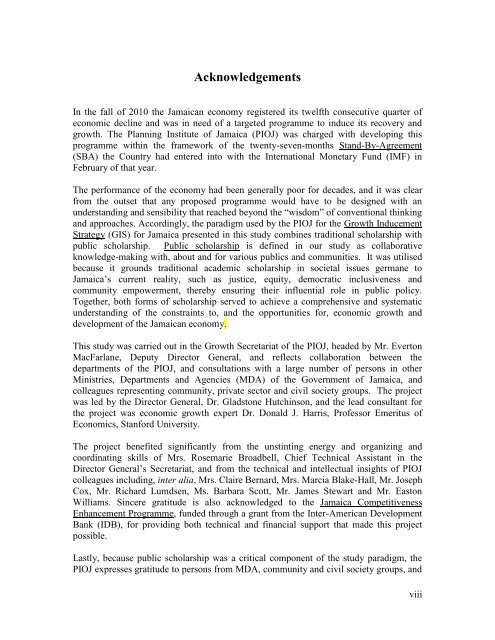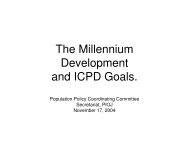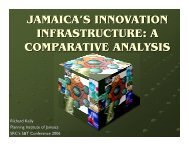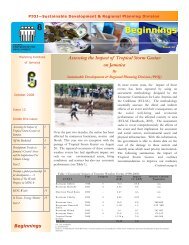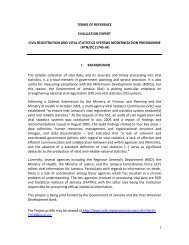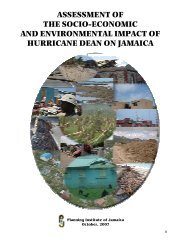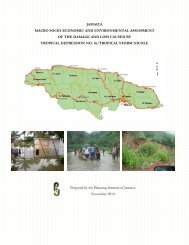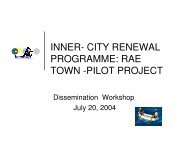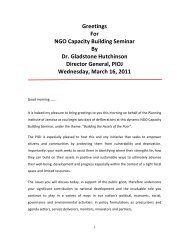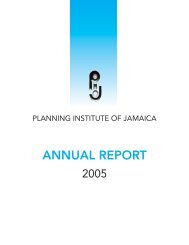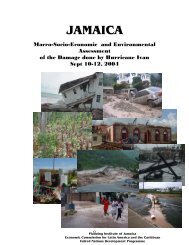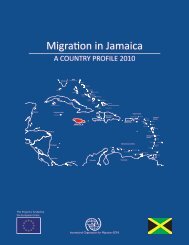PIOJ Growth-Inducement Strategy - Planning Institute of Jamaica
PIOJ Growth-Inducement Strategy - Planning Institute of Jamaica
PIOJ Growth-Inducement Strategy - Planning Institute of Jamaica
You also want an ePaper? Increase the reach of your titles
YUMPU automatically turns print PDFs into web optimized ePapers that Google loves.
Acknowledgements<br />
In the fall <strong>of</strong> 2010 the <strong>Jamaica</strong>n economy registered its twelfth consecutive quarter <strong>of</strong><br />
economic decline and was in need <strong>of</strong> a targeted programme to induce its recovery and<br />
growth. The <strong>Planning</strong> <strong>Institute</strong> <strong>of</strong> <strong>Jamaica</strong> (<strong>PIOJ</strong>) was charged with developing this<br />
programme within the framework <strong>of</strong> the twenty-seven-months Stand-By-Agreement<br />
(SBA) the Country had entered into with the International Monetary Fund (IMF) in<br />
February <strong>of</strong> that year.<br />
The performance <strong>of</strong> the economy had been generally poor for decades, and it was clear<br />
from the outset that any proposed programme would have to be designed with an<br />
understanding and sensibility that reached beyond the “wisdom” <strong>of</strong> conventional thinking<br />
and approaches. Accordingly, the paradigm used by the <strong>PIOJ</strong> for the <strong>Growth</strong> <strong>Inducement</strong><br />
<strong>Strategy</strong> (GIS) for <strong>Jamaica</strong> presented in this study combines traditional scholarship with<br />
public scholarship. Public scholarship is defined in our study as collaborative<br />
knowledge-making with, about and for various publics and communities. It was utilised<br />
because it grounds traditional academic scholarship in societal issues germane to<br />
<strong>Jamaica</strong>’s current reality, such as justice, equity, democratic inclusiveness and<br />
community empowerment, thereby ensuring their influential role in public policy.<br />
Together, both forms <strong>of</strong> scholarship served to achieve a comprehensive and systematic<br />
understanding <strong>of</strong> the constraints to, and the opportunities for, economic growth and<br />
development <strong>of</strong> the <strong>Jamaica</strong>n economy.<br />
This study was carried out in the <strong>Growth</strong> Secretariat <strong>of</strong> the <strong>PIOJ</strong>, headed by Mr. Everton<br />
MacFarlane, Deputy Director General, and reflects collaboration between the<br />
departments <strong>of</strong> the <strong>PIOJ</strong>, and consultations with a large number <strong>of</strong> persons in other<br />
Ministries, Departments and Agencies (MDA) <strong>of</strong> the Government <strong>of</strong> <strong>Jamaica</strong>, and<br />
colleagues representing community, private sector and civil society groups. The project<br />
was led by the Director General, Dr. Gladstone Hutchinson, and the lead consultant for<br />
the project was economic growth expert Dr. Donald J. Harris, Pr<strong>of</strong>essor Emeritus <strong>of</strong><br />
Economics, Stanford University.<br />
The project benefited significantly from the unstinting energy and organizing and<br />
coordinating skills <strong>of</strong> Mrs. Rosemarie Broadbell, Chief Technical Assistant in the<br />
Director General’s Secretariat, and from the technical and intellectual insights <strong>of</strong> <strong>PIOJ</strong><br />
colleagues including, inter alia, Mrs. Claire Bernard, Mrs. Marcia Blake-Hall, Mr. Joseph<br />
Cox, Mr. Richard Lumdsen, Ms. Barbara Scott, Mr. James Stewart and Mr. Easton<br />
Williams. Sincere gratitude is also acknowledged to the <strong>Jamaica</strong> Competitiveness<br />
Enhancement Programme, funded through a grant from the Inter-American Development<br />
Bank (IDB), for providing both technical and financial support that made this project<br />
possible.<br />
Lastly, because public scholarship was a critical component <strong>of</strong> the study paradigm, the<br />
<strong>PIOJ</strong> expresses gratitude to persons from MDA, community and civil society groups, and<br />
viii


